- Home
- Edith Wharton
Fast and Loose
Fast and Loose Read online
ALSO BY EDITH WHARTON
Fiction
The Greater Inclination
The Touchstone
Crucial Instances
The Valley of Decision
Sanctuary
The Descent of Man and Other Stories
The House of Mirth
Madame de Treymes
The Fruit of the Tree
The Hermit and the Wild Woman and Other Stories
Tales of Men and Ghosts
Ethan Frome
The Reef
The Custom of the Country
Bunner Sisters
Xingu and Other Stories
Summer
The Marne
The Glimpses of the Moon
A Son at the Front
Old New York: False Dawn, The Old Maid, The Spark, New Year’s Day
The Mother’s Recompense
Here and Beyond
Twilight Sleep
The Children
Hudson River Bracketed
Certain People
The Gods Arrive
Human Nature
The World Over
Ghosts
The Buccaneers
Non-Fiction
The Decoration of Houses
Italian Villas and Their Gardens
Italian Backgrounds
A Motor-Flight Through France
Fighting France, from Dunkerque to Belfort
French Ways and Their Meaning
In Morrocco
The Writing of Fiction
A Backward Glance
Poetry
Verses
Artemis to Actaeon and Other Verse
Twelve Poems
All rights reserved.
This title is in the public domain in Canada and is not subject to any license or copyright.
Cover design: Jennifer Lum
Ebook ISBN 9780735252677
www.penguinrandomhouse.ca
v5.3.2
a
Contents
Cover
Also by Edith Wharton
Title Page
Copyright
Dedication
Chapter I: Hearts & Diamonds
Chapter II: Enter Lord Breton
Chapter III: Jilted
Chapter IV: The End of the Idyl
Chapter V: Lady Breton of Lowood
Chapter VI: At Rome
Chapter VII: The Luckiest Man in London
Chapter VIII: Jack the Avenger
Chapter IX: Madeline Graham
Chapter X: At Interlaken
Chapter XI: The End of the Season
Chapter XII: Poor Teresina
Chapter XIII: Villa Doria-Pamfili
Chapter XIV: Left Alone
Chapter XV: A Summons
Chapter XVI: Too Late
Chapter XVII: Afterwards
…“Let woman beware
How she plays fast & loose thus with human despair
And the storm in man’s heart.” Robert Lytton: Lucile.
Dedication
To
Cornélie
“[Donna] beata e bella” [illegible] Quinta.
(October 1876)
Chapter I
Hearts & Diamonds
“ ’Tis best to be off with the old love
Before you are on with the new!” Song.
A Dismal Autumn afternoon in the country. Without, a soft drizzle falling on yellow leaves & damp ground; within, two people playing chess by the window of the fire-lighted drawing-room at Holly Lodge. Now, when two people play chess on a rainy afternoon, tête-à-tête in a room with the door shut, they are likely to be either very much bored, or rather dangerously interested; & in this case, with all respect to romance, they appeared overcome by the profoundest ennui. The lady—a girl of about 18, plump & soft as a partridge, with vivacious brown eyes, & a cheek like a sun-warmed peach—occasionally stifled a yawn, as her antagonist, curling a slight blonde moustache (the usual sign of masculine perplexity) sat absently meditating a move on which the game, in his eyes, appeared to depend; & at last, pushing aside her chair, she rose & stood looking out of the window, as though even the dreary Autumn prospect had more attraction for her than the handsome face on the other side of the chess-board. Her movement seemed to shake her companion out of his reverie, for he rose also, & looking over her shoulder, at the soft, misty rain, observed rather languidly, “Cheerful weather!” “Horrid!” said the girl, stamping her foot. “I am dying of stagnation.” “Don’t you mean to finish the game?” “If you choose. I don’t care.” “Nor I—It’s decidedly a bore.” No answer. The bright brown eyes & the lazy blue ones stared out of the window for the space of five slow minutes. Then the girl said: “Guy!” “My liege!” “You’re not very amusing this afternoon.” “Neither are you, my own!” “Gallant for a lover!” she cried, pouting & turning away from the window. “How can I amuse a stone wall? I might talk all day!” She had a way of tossing her pretty little head, & drawing her soft white forehead, that was quite irresistible. Guy, as the most natural thing in the world, put his arm about her, but was met with a sharp, “Don’t! You know I hate to be taken hold of, Sir! Oh, I shall die of ennui if this weather holds.” Guy whistled, & went to lean against the fireplace; while his betrothed stood in the middle of the room, the very picture of “I-won’t-be-amused” crossness. “Delightful!” she said, presently. “Really, your conversation today displays your wit & genius to a remarkable degree.” “If I talk to you, you scold, Georgie,” said the lover, pathetically. “No, I don’t! I only scold when you twist your arms around me.” “I can’t do one without the other!” Georgie laughed. “You do say nice things, Guy! But you’re a bore this afternoon, nevertheless.” “Isn’t everything a bore?” “I believe so. Oh, I should be another person gallopping over the downs on Rochester! ‘What’s his name is himself again!’ Shall we be able to hunt tomorrow?” “Ask the clerk of the weather,” said Guy, rather dismally. “Guy! I do believe you’re going to sleep! Doesn’t it rouse you to think of a tear ’cross country after the hounds? Oh, Guy, a red coat makes my blood run faster!” “Does it?—Georgie, have you got ’Je l’ai perdu’—the thing I sent you from London?” “Yes—somewhere.” “I am going to sing,” said Guy. “What a treat!” “As you don’t object to my smoking, I thought you mightn’t mind my singing.” “Well,” said Georgie, mischievously, “I don’t suppose it does matter much which sense is offended. What are you going to sing?” Guy, without answering, began to hunt through a pile of music, & at last laid a copy of “The ballad to Celia” on the piano-rack. Georgie sat down, & while he leaned against the piano, struck a few prelude-chords; then he began to sing in a rich barytone, Ben Jonson’s sweet old lines. At the end of the first stanza, Georgie shut the piano with a bang. “I will not play if you sing so detestably out of time, tune & everything. Do make yourself disagreeable in some less noisy way.” “I think I shall make myself agreeable—by saying goodbye.” “Very well, do!” “Georgie—what is the matter?” He took her little hand as he spoke, but she wrenched it away, stamping her foot again. “Dont & dont & dont! I’m as cross as I can be & I won’t make friends!” she cried in a sort of childish passion, running away from him to the other end of the room. He stood for a moment, twirling his moustache; then, taking up his hat, said, “Goodbye.” “Goodbye—Are you very angry?” she said, coming a step or two nearer, & looking up through her soft lashes. “No, I suppose not. I believe I have been boring you confoundedly.” “I suppose I have been very cross.” “Not more than I deserved, probably. I am going to London for a few days. Will you give me your hand for goodbye?” She stood still a moment, looking at him thoughtfully; then put out her hand. “Ah, Guy, I am a worthless little thing,” she
said, softly, as he took it. It was her left hand & a ring set with diamonds twinkled on it. “Worth all the world to me!” he answered; then lifted the hand to his lips & turned away. As his receding steps sounded through the hall, Georgie Rivers, taking a screen from the mantel-piece, sat down on the rug before the fire, with a thoughtful face out of which all the sauciness had vanished. As she watched the fire-light play on her ring, she began to think half-aloud as her childish fashion was; but Guy was cantering along the high road to West Adamsborough, & if there had been anyone to tell him what she said, he would [have] laughed—& [have] doubted it. As there was no one, however, Georgie kept her meditations to herself. “I know he thinks me a coquette,” she whispered, leaning her head against her hand, “& he thinks I like to trifle with him—perhaps he is angry—(he looks very handsome when he is angry) but he doesn’t know—how should he?—that I mean to break it off. I ought to have done it today, & I might have ended that beginning of a quarrel by giving him back the ring; but, oh dear, I wish—I wish I didn’t care for him quite so much. He is so cool & handsome! And he is the only man I ever knew who neither despises me nor is afraid of me. Oh, Georgie, Georgie, you miserable little fool! I didn’t mean to let him kiss my hand; he surprised me into it, just as he surprised me into accepting him. He always puts me off my guard, somehow! But it must be done. Perhaps I am in love with him, but I hope I haven’t quite lost my common sense. It must be done, I say! I declare, I shall make an utter goose of myself in a minute! Where’s that letter?” She put her hand into her pocket, & brought out an envelope, pompously sealed with a large coat of arms & motto; &, drawing out the folded sheet which it contained, slowly read aloud these words, written in a crabbed, old-fashioned hand:
My dear Miss Rivers: Ever since I was honoured by an introduction to you, my admiration for your charms & accomplishments has increased; & I have been sufficiently marked by your favour to hope that what I am about to say may not seem an entirely unwarrantable liberty. Although we are separated by many years, I do not perceive why that should be an obstacle to a happy union; & I therefore venture to beg that, if the profoundest admiration & respect can awaken responsive sentiments in your own bosom, you will honour me with your hand. I shall await with impatience your reply to my proposals, & am, my dear Miss Rivers, with deep esteem, Your faithful Servant
“Breton.”
Georgie folded the letter again, & went on with her reflections in this wise. “I suppose I should have let him know that I was engaged to Guy, but it was so jolly to have an old Lord dangling about one, head over ears in love, &, figuratively speaking, going down on his noble, gouty knees every time one came into the room. And I really didn’t think it would come to a climax so soon! I marked him by my favour, did I? And the poor old creature has got tipsy, like an old blue-bottle on a little drop of syrup. He is really in love with me! Me, Georgie Rivers, a wicked, fast, flirtatious little pauper—a lazy, luxurious coquette! Oh, Guy, Guy!—I mean, Oh, Lord Breton, Lord—ha? what’s the matter?” For something dropped close by Georgie’s ring, that sparkled as clearly in the fire-light as its own diamonds. “Crying! Crying! I thought I had no heart. I have always been told so. Ah, the horrid thing.” She brushed the bright thing that was not a diamond away, but just then her eyes brimmed over with two more, & she was obliged to dry them with her pocket handkerchief, talking on all the while. “This is too ridiculous. Georgie getting sentimental! Georgie booh-hoohing over a lover, when she’s got a real, live Lord, with a deer-park, & a house in London & ever so much a year, at her feet! What else have I always wished for? But, come, I will think of it calmly. Say I am in love with Guy (if I have no heart, how can I love anybody?) say I am in love with him. He is poor, rather extravagant, lazy & just as luxurious as I am. Now, what should we live on? I should have to mend my clothes, & do the shopping, & I should never ride or dance or do anything worth living for any more; but there would be pinching & patching & starvation (politely called economy) & I should get cross, & Guy would get cross, & we should fight, fight, fight! Now—take the other side of the picture. First, Lord B. is really in love with me. Second, he is venerable, sleepy & fixed in his own ruts, & would give me twice as much liberty as a younger man; third, I should have three fine houses, plenty of horses & as many dresses as I could wear, (& I have a large capacity in that way!) & nothing to do but coquet with all the handsome boys whose heads I chose to turn; fourth, I should be Lady Breton of Lowood, & the first lady in the county! Hurrah!” As Georgie ended this resumé of the advantages of her ancient suitor, she clapped her hands together & jumped up from the hearth-rug. “It must be done. I am sure Guy & I could never be happy together, & I shall write & tell him so, the sooner the better. I suppose Mamma will be a little scandalized, but I can settle that. And when shall I ever have such a chance again?” She reopened Lord Breton’s letter, read it for the third time, & then went up to the writing table that stood between the two windows. “The sooner the better, the sooner the better,” she repeated, as she sat down & took out a sheet of paper stamped with the Rivers crest. She dipped her pen in ink, dated the blank sheet—& then paused a moment, with contracting eye-brows. “No. I suppose that I must write to Guy first. What shall I say? It is so hard…I…hush, you little idiot! Are you going to change your mind again?” With this self-addressed rebuke, she re-dipped her pen, & began to write hastily—
Dear Guy: I am sure we can never be happy as anything but friends, & I send you back the ring which will be far better on someone else’s hand. You will get over your fancy, & I shall Always be, Your Affectionate Cousin G.R.
To Guy Hastings Esqr.
It was soon over, & she laid the pen down & pushed the paper away quickly, covering her eyes with her hand. The clock, striking the hour on the chimney-piece, roused her with a start. “I suppose I had better take this ring off,” she said, slowly, gazing at the hoop of diamonds. “There is no use in hesitating—or the battle is lost. There—what is it, a ring? It will be replaced by another (with bigger diamonds) tomorrow afternoon.” She drew it off hurriedly, as though the operation were painful, & then looked at her unadorned hand. “You change owners, poor little hand!” she said softly. Then she kissed the ring & laid it away. After that it was easier to go on with her next note, though she wrote two copies before she was satisfied that it was proper to be sent to the great Lord Breton.
The note finally ran thus:
My dear Lord Breton: I was much flattered by your offer, which I accept, remaining Yours truly
(I shall be at home tomorrow afternoon.) Georgina Rivers.
“Like answering a dinner-invitation,” commented Georgie; “but I can’t make it longer. I don’t know what to say!”
Chapter II
Enter Lord Breton
“Auld Robin Gray cam ‘a courtin’ me.” Lady Barnard.
Let it be understood by the reader, in justice to Miss Rivers, that, before she despatched the note with which our last chapter closes, she shewed it to her mother. As she had expected, that lady offered some feeble opposition to her daughter’s bold stroke. It was early the next morning & Mrs. Rivers—a nervous invalid, of the complainingly resigned sort—was still in her bedroom, though the younger members of the family, Kate, Julia & Tom, had breakfasted & been called to their lessons, by Miss Blackstone, their governess. Georgie therefore found her mother alone, when she entered with the answer to Lord Breton’s letter in her hand; & it was easy, after one glance at the small figure on the couch, with faded hair, pink lids & yielding wrinkles about the mouth, to see why, though “Mamma would be a little scandalized” it would be easy to “settle that.” If Mrs. Rivers had ever been a beauty much mourning & malady had effaced all traces thereof from her gentle, sallow face framed in a heavy widow’s cap; she was one of those meek, shrinking women who seem always overwhelmed by their clothes, & indeed by circumstances in general. She greeted her daughter’s entrance with a faint smile, & observed in a thin, timid voice “that it was a beautiful morning.” “
Yes,” said Georgie, kissing her, “jolly for hunting. How did you sleep, little Mamma?” “Oh, well enough, my dear—as well as I could have hoped,” said Mrs. Rivers, sighing. “Of course Peters forgot my sleeping-draught when he went into West Adamsborough yesterday, but what else could I expect?” “I am very sorry! The man never had his proper allowance of brains.” “Nay, my dear, I do not complain.” “But I do,” said Georgie, impatiently. “I hate to be resigned!” “My child!” “You know I do, Mamma. But I want to speak to you now. Will Payson be coming in for anything?” “Indeed I can’t tell, my dear.” (Mrs. Rivers was never in her life known to express a positive opinion on any subject.) “Very well, then” said Georgie, “I will make sure.” She locked the door, & then came & sat down at her mother’s feet. “Now, Mamma, I am going to shock you,” she said. “Oh, my dear, I hope not.” “But I tell you that I am,” persisted Georgie. “Now listen. I have decided that I shouldn’t be happy with Guy, & I have written to tell him so.” Mrs. Rivers looked startled. “What has happened, my love?” she asked anxiously. “I hope you have not been quarrelling. Guy is a good boy.” “No, we have not been quarrelling—at least, not exactly. But I have thought it all over. Guy & I would never get on. And I am going to accept Lord Breton!” “Good gracious, my dear!” cried Mrs. Rivers, in mingled horror & admiration at her daughter’s sudden decision. “But what will Guy say?…Have you reflected?…” “I have set Guy free; therefore I am at liberty to accept Lord Breton.” “But—so soon? I don’t understand,” said poor Mrs. Rivers, in humble perplexity. “Of course the engagement will not be announced at once; but Lord Breton’s letter requires an answer & I have written it.” She handed the note to her mother, who looked over it with her usual doubtful frown, but whose only comment was a meek suggestion that it was very short. “I can’t write four pages to say I’ll accept him,” said Georgie, sharply; & Mrs. Rivers, reflecting that her unusual crossness was probably due to concealed agitation, only said mildly, “but poor Guy.” “Why do you pity Guy, Mamma? He will be rid of me, & if he is really in love with me—why, men get over those things very quickly.” “But I cannot help thinking, my dear…” “Don’t, Mamma!” cried Georgie, passionately, “don’t think. I have made up my mind, & if you talk all day you can only make me cry.” The last word was almost a sob, & Georgie turned sharply away from her mother. “I am afraid you are unhappy, darling child.” “Why should I be?” burst out Georgie, with sudden fierceness. “Don’t be so foolish Mamma! Why should I be unhappy? It is my own choice, & I don’t want to be pitied!” She ran out of the room as she ended, & Mrs. Rivers’ anxious ears heard her bedroom door slam a moment later. The note was sent duly, that morning; & in the afternoon the various members of the family saw, from their respective windows, Lord Breton of Lowood ride up to the door of Holly Lodge. Georgie, with an unusual colour in her face, which was set off by the drooping ruffle of lace about her soft throat, came in to her mother’s room for a kiss & a word or two. Now that Guy’s ring had really been sent back, she seemed to have nerved herself to go through the day resolutely; & with a quick, firm step, & her head higher than its wont she went downstairs to meet her suitor. Lord Breton was leaning against the mantel-piece where Guy had stood yesterday; & it would have been hard to find a greater contrast to that handsome young gentleman than Georgie’s noble lover. Fifty-eight years of what is commonly called hard living had left heavy traces on what in its day was known as a fine figure; & in the Lord Breton whom some few could remember as “that gay young buck” the present generation saw nothing but a gray gouty old gentleman, who evidently enjoyed his port wine & sherry generously. He came forward as Georgie entered, & bending over her hand (it was not the hand that Guy had kissed) said, pompously: “I need not say how deeply I feel the honour you confer on me, Miss Rivers. This is indeed a happy day!” “Thank you,” said Georgie, with a wild desire to draw her hand away; “you are very kind, Lord Breton.” “No, no,” returned his lordship affably; “I only rejoice in being allowed to call mine a young lady so abundantly endowed with every charm as Miss Rivers—as—May I call you Georgina?” Georgie started; no one had ever called her by her name, preferring the boyish abbreviation which seemed to suit her lively, plump prettiness best; but, after all, it was better he should not call her as Guy did. Georgina was more suitable for the future Lady Breton. “You have won the right to do so,” she said, as she sat down, & Lord Breton took a chair opposite, at an admiring distance. “A most precious right,” he replied, conjuring up the ghost of what some might recall as a fascinating smile; but which was more like a bland leer to the eye unassisted by memory. “Let me assure you,” he continued, “that I know how little a man of my advanced years deserves to claim the attention of a young lady in the lovely bloom of youth; but—ahem—I hope that the name, the title—& above all the respect & esteem which I lay at her feet may compensate—” he paused, & evidently wondered that Georgie did not reply to this sublime condescension; but as she was silent, he was forced to take up the thread of his speech. “As I said in my letter, you will remember, Miss…Ah…Georgina—as I said in my letter, I do not see why difference of age should be an obstacle to a happy union; & as—ahem—& since your views so happily coincide with mine, permit me to—to adorn this lovely hand with—a—with—” here Lord Breton, finding that his eloquence had for the moment run dry, supplied the lack of speech by action, & producing a brilliant ruby set in large diamonds, slipped it on Georgie’s passive hand. “I hope you will accept this, as a slight token of—of…” “It is very beautiful,” said Georgie, colouring with pleasure, as the dark fire of the ruby set off the whiteness of her hand. “You are most generous. But you will forgive me if I do not wear it, at least in public. I should prefer not to have the engagement announced at once.” Lord Breton looked justly astonished, as he might have done if a crossing-sweeper to whom he had tossed a shilling had flung it back in his face. “May I ask why this—this secrecy must be preserved?” he said, in a tone of profound, but suppressed, indignation; remembering, just in time, that though the wife is a legitimate object of wrath, it is wise to restrain one’s self during courtship. “I am going to shew you what a spoiled child I am, by refusing to tell you,” said Georgie, putting on an air of imperious mischievousness to hide her growing agitation, “& I know you will humour me. I am so used to having my own way, that it might be dangerous to deprive me of it!” If she had not said this with a most enchanting smile, naughty & yet appealing, Lord Breton might not have been so easily appeased; but being charmed with this pretty display of wilfulness (as men are apt to be before marriage) & concluding that her mother might have something to do with the obstruction she would not name, he only said, with a bow, “The loss is on my side, however! I shall count the days until I can proclaim to the world what a prize I have won.” Georgie laughed; a sweet, little bird-like laugh, which was as resistless as her pout. “You pay me so many compliments that I shall be more spoiled than ever! But you will not have to wait long, I promise you.” “No waiting can be very long while I am privileged to enjoy your companionship,” said Lord Breton, rising to the moment triumphantly. “Oh, for shame! Worse & worse!” cried Georgie. “But I think Mamma is in the study. Won’t you come in & see her?”

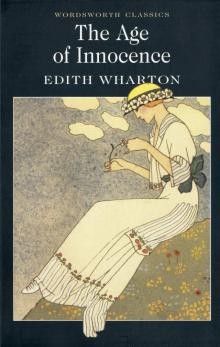 The Age of Innocence
The Age of Innocence The Reef
The Reef Summer
Summer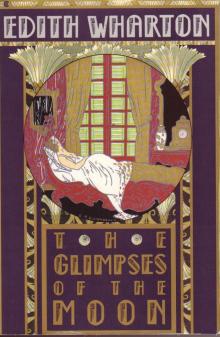 The Glimpses of the Moon
The Glimpses of the Moon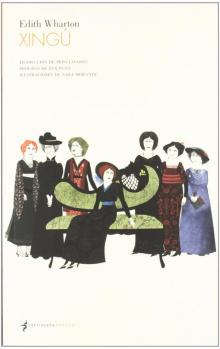 Xingu
Xingu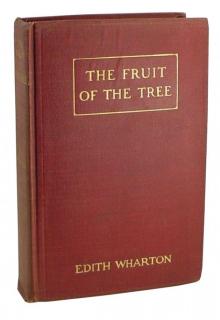 The Fruit of the Tree
The Fruit of the Tree Fast and Loose
Fast and Loose Artemis to Actaeon and Other Verse
Artemis to Actaeon and Other Verse The Line of Least Resistance
The Line of Least Resistance The Lamp of Psyche
The Lamp of Psyche The Reckoning
The Reckoning Afterward
Afterward The New York Stories of Edith Wharton
The New York Stories of Edith Wharton The 2014 Halloween Horrors Megapack
The 2014 Halloween Horrors Megapack 'Copy': A Dialogue
'Copy': A Dialogue The Recovery
The Recovery The Fulness of Life
The Fulness of Life Early Short Stories Vol. 1
Early Short Stories Vol. 1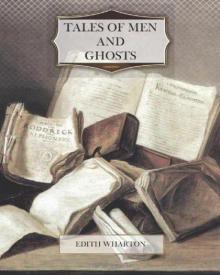 Tales of Men and Ghosts
Tales of Men and Ghosts The House of the Dead Hand
The House of the Dead Hand That Good May Come
That Good May Come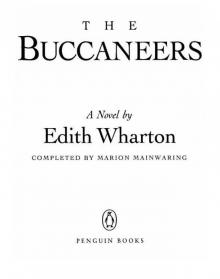 The Buccaneers
The Buccaneers Other Times, Other Manners
Other Times, Other Manners The Hermit and the Wild Woman
The Hermit and the Wild Woman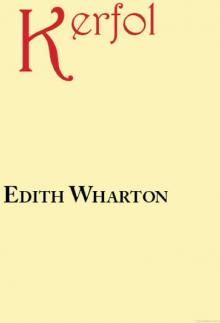 Kerfol
Kerfol The Duchess at Prayer
The Duchess at Prayer Bunner Sisters
Bunner Sisters The Choice
The Choice Madame De Treymes
Madame De Treymes Ethan Frome, Summer, Bunner Sisters
Ethan Frome, Summer, Bunner Sisters In Morocco
In Morocco The Valley of Decision
The Valley of Decision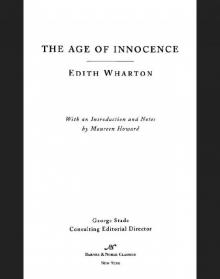 Age of Innocence (Barnes & Noble Classics Series)
Age of Innocence (Barnes & Noble Classics Series) The Angel at the Grave
The Angel at the Grave April Showers
April Showers Sanctuary
Sanctuary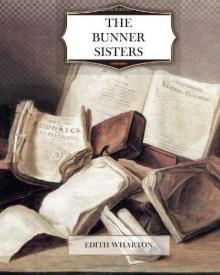 The Bunner Sisters
The Bunner Sisters Mrs. Manstey's View
Mrs. Manstey's View Writing a War Story
Writing a War Story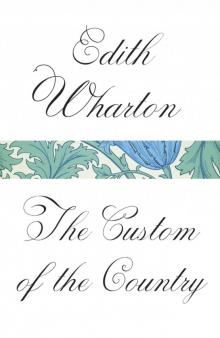 The Custom of the Country
The Custom of the Country In Trust
In Trust The Triumph of the Night
The Triumph of the Night The Hermit and the Wild Woman, and Other Stories
The Hermit and the Wild Woman, and Other Stories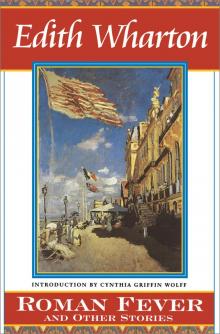 Roman Fever and Other Stories
Roman Fever and Other Stories The Mission of Jane
The Mission of Jane The Descent of Man and Other Stories
The Descent of Man and Other Stories Coming Home
Coming Home The Touchstone
The Touchstone Early Short Stories Vol. 2
Early Short Stories Vol. 2 Edith Wharton's Verse, 1879-1919, from various journals.
Edith Wharton's Verse, 1879-1919, from various journals.